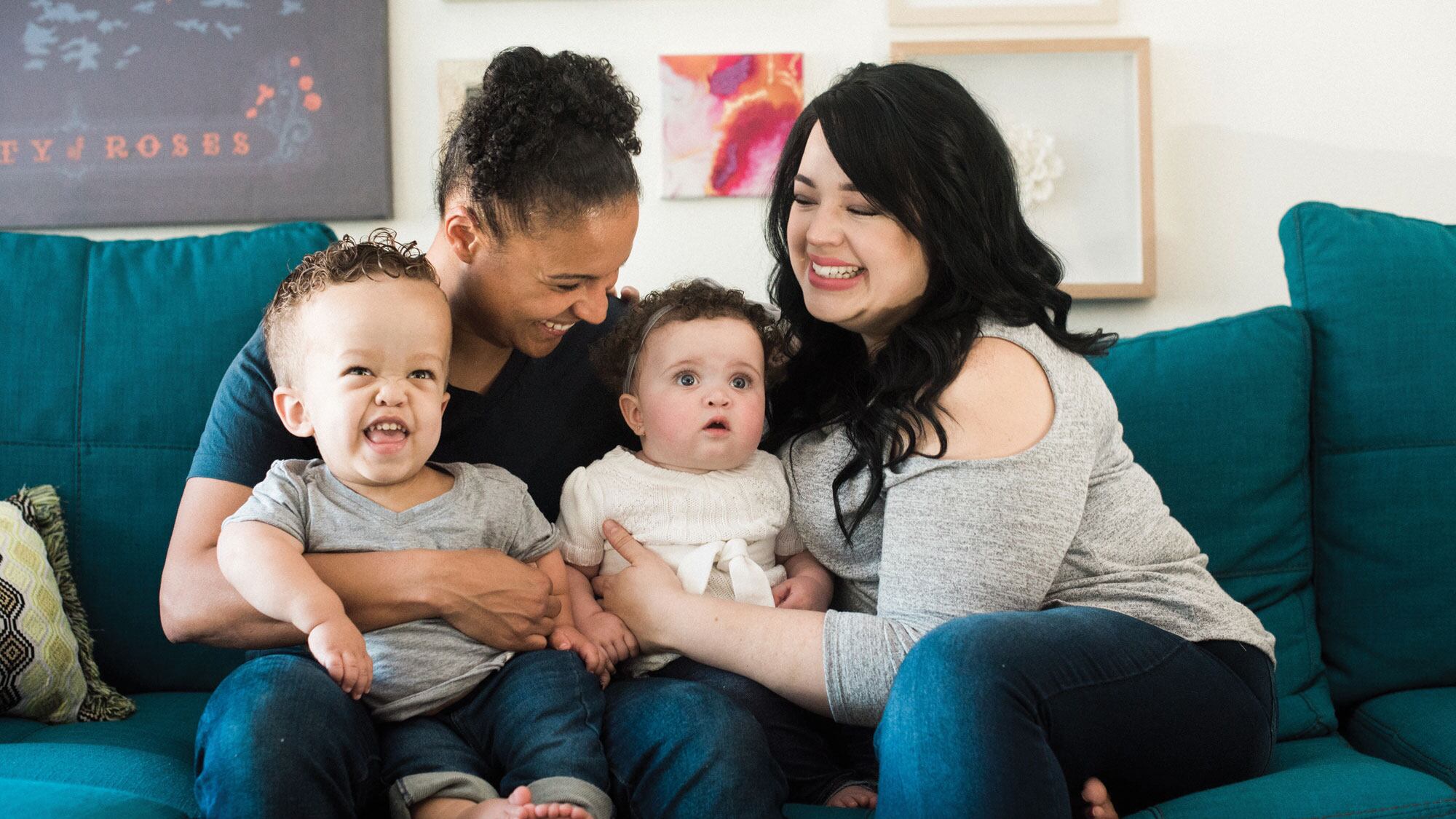For Liz and Andrea Swanby, Phoenix was no place to raise a child.
"We were a gay family with a special needs son, and the political climate was terrifying," Andrea says. When Andrea was nine months pregnant with their son, Max, she says, "we found out [he] was going to be a little person, and we were terrified to be living in Phoenix."
When Liz's employer, Amazon, offered her a job in Portland in 2015, the couple jumped at the chance. Since then, the couple has moved to Beaverton, purchased a home and had another child, Ophelia.

The Swanbys aren't alone. They're part of a national migration that has made Portland a destination for LGBTQ parents.
Gallup polls show that between 2012 and 2016, the Pacific Northwest experienced the most growth in residents who identify as lesbian, gay, bisexual or transgender. And Portland continues to be a destination city for all kinds of people. But conversations with LGBTQ residents suggest a big reason for Portland's queer-identifying population boom is babies.
"We don't feel 'non-traditional' here," Liz Swanby says. "Yes, the cost of living here is higher than the national average, but we're totally willing to pay more to have peace of mind and feel like our kids are accepted. You can't put a price on that."

Why is the Rose City a destination? It's thanks, in part, to Oregon Reproductive Medicine—an acclaimed local fertility clinic that helps LGBTQ couples from all over the world conceive genetically related children. It's also due to Oregon laws that make legal parentage for non-heterosexual couples easy, and the city's openness to LGBTQ communities.
From their first visit to ORM, the Swanbys say they were surrounded by other gay couples also in the process of building families.
"You feel like you are amongst your people," Liz says.
To conceive Ophelia, now just over a year old, Liz and Andrea went to ORM for a process called reciprocal in vitro fertilization. Liz's egg was extracted and inseminated with cryobank sperm—the same sperm used to conceive Max, who is 3—and the fertilized embryo was implanted in Andrea's uterus for gestation.
"It sounds so sci-fi," Andrea says.

For some ORM patients, especially when neither person in a couple can physically carry a child, conception may be more difficult. But in Oregon, there are hundreds of willing surrogates.
Tabatha Koh, a local surrogacy lawyer and legal director for the Northwest Surrogacy Center, estimates the agency is in contact with around 500 individuals who want to be gestational carriers—with around 200 to 300 actively undergoing IVF, or who are pregnant or recently postpartum. The Northwest Surrogacy Center also has clinics in California and Colorado, but Koh says at least two-thirds of the surrogates the agency works with are located in Oregon.
"There's this pro-family, pro-woman, pro-pregnancy culture here," Koh says, "that results in there being many women living in Oregon who are able, willing and passionate about helping to create a family. Women affirmatively wanting to help gay families as their part in social justice battles helps to counteract some of the barriers to LGBTQ families being created."
"The reason we see LGBTQ patients from all over the world is that this is a really safe place to pursue child-bearing goals," says ORM reproductive endocrinologist Dr. Brandon Bankowski. "I've seen couples who have been given the wrong baby in other countries, or failed multiple embryo transfers even though they used hand-picked donors, because the quality of the lab was not good."
Bankowski says over half his patient base are LGBTQ couples, some of whom travel from as far as Tel Aviv, London or Shanghai.
ORM's donor egg and gestational carrier (surrogacy) live birth rate of 72 percent is well above the national average of 50 percent, according to 2016 U.S. Society for Assisted Reproductive Technology data.
But state-of-the-art labs aren't Oregon's only appeal.
Legally, even before same-sex marriage was recognized federally in 2013, Koh says Oregon made it easy for both parents' names to be listed on a birth certificate, regardless of who had carried the child. (That's thanks to the Oregon Family Fairness Act, which became law in 2007.) Upon request, the Oregon Center for Health Statistics provides parents with birth certificates that read "parent/parent," rather than "mother/father."
With fewer barriers restricting LGBTQ Portland couples from parenthood, Koh says family planning is becoming an expectation rather than a dream.
"When I talk to young gay couples—couples in their 30s—it is an assumption that they are going to be parents and going to have a family that is acknowledged, honored and respected," she says. "A generation ago, that was not an assumption for the community."

Erin and Chris Collins—who also went to ORM for reciprocal IVF treatment to conceive their son, Oso—say they were lucky that Chris' employer, GitHub—a local software development company—paid for a majority of their $30,000 IVF treatment.
"Before I got the job, I didn't know how we were ever going to be able to afford it. A lot of people go into debt," Chris says. "Hetero couples don't know how easy they have it."
Erin Collins, who is originally from West Virginia, says: "I like to rate cities based on a 'gawking factor.' If I'm walking down the street holding my partner's hand in West Virginia, we definitely get gawked at. In Portland, we don't. Having a baby as two moms, we don't even think twice about it."

Q&A With Dyke March Organizer Belinda Carroll | Q&A With Queer Liberation Front Member Tony Hadden | Q&A with Greater Portland Trans Unity
Eleven Years and Multiple Venue Changes Later, Blow Pony Remains Portland's Wildest LGBTQ Dance Party | Five More Queer-Centric Dance Parties In Portland
An All-Portland Pride Playlist | A Pride Events Calendar
Portland Still Has Work To Do in Meeting LGBTQ Mental Health Care Needs
When I Had No Place Else To Go, I Lived in One of Portland's Last Bathhouses

